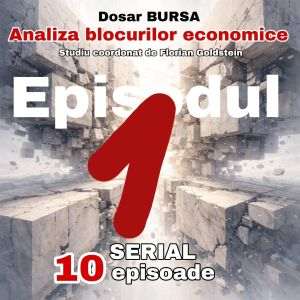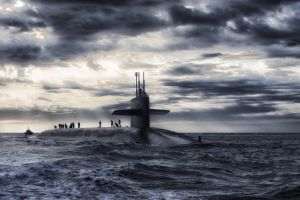The latest annual report of the National Bank of Romania (NBR) suggests that it is exercising caution when it comes to the solutions which have been proposed for dealing with the current economic crisis. Moreover, the governor of the Central Bank, Mugur Isărescu, stated last week, that the world is at the end of a 40-year cycle, which it is hard to know what it will be followed by. He said: "I can't get away from my personal experiences. I think that we are all of us prisoners of the life that we have lived and that we still have on this Earth and we react accordingly. I entered my adult life, which was a relatively public one, in 1971, as the post-war system of Bretton Woods, which also lasted about 40 years, based on a price of gold of about 35 dollars an ounce. And I have seen how everything that was considered true before "71 and what I had read was no longer true in economic thought, the exchange rates were not supposed to be fixed, they weren't good anymore, gold was no longer supposed to be used as a currency".
Sometime in the 80s, I noticed that we were entering a new cycle - market freedom, monetarism, new keynesianism, and in 2007 I saw turmoil and reconsidering, this crisis began. I think that at the end of a 40-year cycle, I don't really know what follows".
In this context, last year the NBR opted to reduce its long term placements and to increase the short term ones. Thus the amounts of sight deposits of the Central Bank increased almost four times, in 2012, to 30.763 billion lei. At the same time, the value of the term deposits dropped by almost half, during the reviewed period, to 7.935 billion lei, at the end of last year, while securities denominated in foreign currencies fell, in turn by almost 20 billion lei, to 94.657 billion lei, on December 31st, 2012.
At the same time, this approach has allowed the NBR to intervene on the money market, to support a "relatively balanced" exchange rate, as Mugur Isărescu called it.
The currency interventions of the Central Bank Băncii Centrale have also represented the main cause which led to the failing of the performance requirement concerning the bank's net foreign assets, agreed with the International Monetary Fund at the end of 2012, as the Governor of the NBR explained on Monday. He said that the political tensions, the local and parliamentary elections, the Greek crisis and the low risk appetite of foreign investors have caused capital outflows of billions of Euros, last year, which were offset through interventions of the NBR.
"We have offset them through selling currencies from the National Bank, and if we add to them the payment of overdue installments, the key ratio was temporarily not met. They (the IMF) didn't do much of a fuss about it either, because if it were a serious issue, I can assure you the Board of the IMF wouldn't have let it slide, so we didn't make much of a fuss either", the head of the Central Bank said.
Out of the three performance criteria agreed by the authorities with the assumed by the authorities before the IMF and which were not fulfilled at the end of last year, namely the criterion concerning the net foreign assets of the NBR, at least concerning the balance of the general consolidated budget and that of the budget, the first was given the least attention by the press and by analysts. Whereas about the budget deficit and the arrears of the authorities there has been lots of ink spilled, the requirement concerning the foreign assets went almost unnoticed, with the question which was addressed on Monday to the governor was the only time the topic was publicly mentioned.
Prior to Monday's meeting of the Board of Directors of the NBR, BURSA had contacted several representatives of the Central Bank, requesting more information concerning the failure of the NBR to meet the Net Foreign Assets requirement. However, they either declined to comment, or they merely stuck to brief answers, such as "This concerns the loans granted by the NBR to non-residents".
According to the latest letter of intent to the IMF, the Net Foreign Assets of the NBR were supposed to increase by 633 million Euros in December 2012, over last year's similar period, but the preliminary data indicated they had dropped 317 million lei, during the reviewed period.
• What are net foreign assets and why was a performance criterion concerning their amount?
The net foreign assets of a country represent the difference between its foreign assets and its foreign liabilities. Their value reflects the indebtedness of the country in question.
The setting of a performance requirement for the Net Foreign Assets of the NBR was intended to limit the intervention of the NBR on the currency market, economist Florin Cîţu said. "The IMF considers that a flexible exchange rate would cause the market to perceive the existence of an exchange rate risk. If the NBR intervenes to prevent the Euro from exceeding a certain level, then the players will always want to be protected by such a risk, which prevents them from taking their own steps towards taking their own safety measures against it", he told us.
An implicit target for the net foreign assets of the NBR is similar to an explicit target for the currency reserves of the institution, from the point of view of the pursued purpose, according to the economist. Florin Cîţu is wondering what would be the goal of making such commitments to the international institutions, if they are not met.
On the other hand, former Finance Minister Sebastian Vlădescu considers that the failure to meet the criterion does not represent a cause for concern: "This reprieve granted by the IMF is normal and the fact that this parameter has not been met does not pose the threat of monetary, financial or macroeconomic destabilization. Certainly not in the following months".
The NBR had major interventions in the currency markets, in the summer of last year, in order to support the leu, which was weakening at an accelerated pace, amid the political tensions started by the suspension of president Traian Băsescu. Whereas, in the beginning of July, the exchange rate was close to 4.45 lei/euro, over the course of approximately three weeks it had reached almost 4.64 lei/euro, only to fall below that level at the end of the month. The first half of August was affected by fluctuations which have taken the Euro as far as 4.6481 lei, but in the second half of the month, the exchange rate entered a downward trend, with the exchange rate going to the levels it had prior to the onset of the political crisis.











































